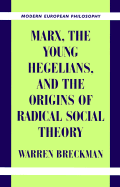Book contents
- Frontmatter
- Contents
- Acknowledgments
- Introduction
- 1 At the End of Idealism: From “Nihilism” to “Positive Philosophy”
- 2 The Transcendent Sovereign and the Political Theology of Restoration
- 3 Ludwig Feuerbach and Christian Civil Society
- 4 The Social and Political Discourse of Personality, 1835–1840
- 5 Pantheism, Social Question, and the Third Age
- 6 Arnold Ruge: Radical Democracy and the Politics of Personhood, 1838–1843
- 7 Karl Marx: From Social Republicanism to Communism
- Conclusion
- Bibliography
- Index
4 - The Social and Political Discourse of Personality, 1835–1840
Published online by Cambridge University Press: 11 January 2010
- Frontmatter
- Contents
- Acknowledgments
- Introduction
- 1 At the End of Idealism: From “Nihilism” to “Positive Philosophy”
- 2 The Transcendent Sovereign and the Political Theology of Restoration
- 3 Ludwig Feuerbach and Christian Civil Society
- 4 The Social and Political Discourse of Personality, 1835–1840
- 5 Pantheism, Social Question, and the Third Age
- 6 Arnold Ruge: Radical Democracy and the Politics of Personhood, 1838–1843
- 7 Karl Marx: From Social Republicanism to Communism
- Conclusion
- Bibliography
- Index
Summary
It was fitting in 1843 that Feuerbach exhorted people to think “in the world as a member of it, not in the vacuum of abstraction as a solitary monad, as an absolute monarch, as an indifferent, otherworldly God.” These similes neatly tied together the homologous theological, philosophical, social, and political associations of his long quarrel with personalism. After all, the fundamental tenets of his theory of religion and his break with speculative philosophy drew on themes that he had first probed in theologico-political tracts like Thoughts on Death and Immortality and his essay on the political theology of Friedrich Julius Stahl. If anything, the seminal works of the late 1830s and early 1840s expressed an intensified preoccupation with the sociopolitical dimension of his critique of religion and speculative philosophy. For example, in an 1839 essay he described the illogic of belief in miracles by referring to their political analogue: “God gave the laws of nature, as a king gives a constitution; what he gives, he can take away again.” And in The Essence of Christianity, a book taken up with the refutation of the idea of divine personality, Feuerbach slipped into the appendices the observation that “personality is only an abstract, modern expression for sovereignty.”
Feuerbach's engagement with the question of the relationship between Christian personalism, society, and politics intersected with the larger context of the religio-political controversies that splintered the Hegelian School in the later 1830s. If Feuerbach grew bolder and more explicit in his attack on religio-political personalism, this was in large part because the debate over the ramifications of the idea of personality greatly intensified after 1835.
- Type
- Chapter
- Information
- Marx, the Young Hegelians, and the Origins of Radical Social TheoryDethroning the Self, pp. 131 - 176Publisher: Cambridge University PressPrint publication year: 1998



